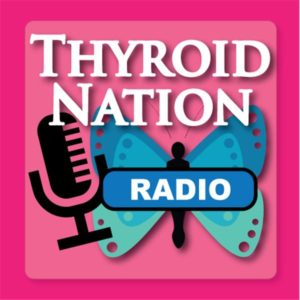Media Kit
Dr. Labbe is available for media interviews and may be open to authoring articles on topics related to her expertise for certain publications. Established book reviewers may also request a review copy of her Amazon #1 Best Seller Thyroid & Menopause Madness.
Dr. Joni Labbe, DC, CCN, DCCN is a board certified clinical nutritionist, with a specialized focus on women’s health issues. She has successfully helped pre-menopausal and menopausal women regain and maintain their health since 1995. She is a professional speaker, radio personality, fitness expert, former radio host of “Healthier Way with Dr. Labbe,” and author of Thyroid & Menopause Madness and It’s Not Menopause; It’s Your Thyroid! She has a diplomate in Clinical Nutrition, and is pursuing a degree in Functional Neurology from the prestigious Carrick Institute.
Dr. Labbe is one of the country’s leading authorities on thyroid disorders, including Hashimoto’s. She has authored numerous articles and blogs on health, nutrition, and thyroid issues. Dr. Labbe resides in San Diego, Calif. She likes chasing the little white ball around the golf course, jogging the hills of San Diego, and listening to music, especially gospel, jazz and the blues; favorites are Ray Charles, Billy Holiday, Etta James, and the great Eric Clapton. Laughing with friends and families over a great tribal meal is her idea of an evening well-spent. Dr. Labbe provides an excellent example of living vibrantly post-menopause. In addition she successfully manages her own symptoms of Hashimoto’s and celiac disease. It’s her life’s mission to help others “lose that voice in your head telling you that you’re crazy lazy, or finished!”
To reach Dr. Labbe, please visit the contact page. If you would like to interview Dr. Labbe or book her on your program, please indicate date and time of the interview.
If you would like to receive a review copy of Thyroid & Menopause Madness please indicate whether you would prefer an ebook or print book and a general time frame for when the review will be published.

Interviews
In this episode of the Thyroid-healthy Bites Podcast with Hypothyroid Chef Ginny Mahar, Dr. Joni Labbe connects the dots between your thyroid and gut health. They discuss some of the most common underlying gut issues for those with thyroid issues and what you can do about them.
Dr. Labbe discusses Thyroid, Hormones, and autoimmune conditions with Dr. Morgan Button during this episode of The Truth about Women’s Hormones Summit.
Dr. Labbe discusses holistic and integrative approaches to optimal thyroid health with ReNee Greenberg
View Dr. Labbe, on KUSI talking about Hashimoto’s being the “invisible” disease.
Dr. Labbe sits down with Natalie Svela for the Wake Up and Live Summit.
Dr. Labbe has been featured on:












Press Release
New Book Sheds Light on How to Turn Mid-Life into the Good Life. Wellness mentor reveals the hidden condition affecting 50 million Americans in mid-life…
SAN DIEGO, Calif. – According to a new book, over 50 million women across the country are suffering from autoimmune disorders…and most don’t even know it.
Dr. Joni Labbe, known as “The Thyroid Doctor,” recently published the book, Thyroid and Menopause Madness to address the lack of information surrounding women’s mid-life health issues. For over a decade, Dr. Labbe treated hundreds of women with thyroid and auto-immune disorders at the Labbe Health Center in San Diego, California.
“So many menopausal and post-menopausal women are suffering from inflammation, exhausted adrenals, hormonal imbalances, hidden auto-immune diseases, anemia, leaky gut, and thyroid disorders,” Dr. Labbe said. “This really is a global epidemic! My book explains what is happening inside their bodies and shows them how they can reclaim a vibrant and energetic life.”
Dr. Labbe felt the impact of these health issues firsthand after being diagnosed with Hashimoto’s disease – an autoimmune disease that attacks the thyroid, adrenal glands, and digestive system – in 2007. Upon further study of autoimmune, thyroid, and hormone disorders, she began treating herself with the methods she would eventually use to help her patients.
In Thyroid and Menopause Madness Dr. Labbe reveals the seven most important factors that cause women to feel so lousy, drowsy, and cranky in mid-life. She then provides a detailed, and holistic plan to manage these symptoms, which includes regular testing, changes in diet, and proper supplementation.
“There is a huge void in the healthcare model for treating, managing, and properly understanding chronic autoimmune conditions, like Hashimoto’s,” said Dr. Labbe. “So many women are being told that their symptoms are just aging or menopause. When I saw how many women were suffering and how dramatically my protocols could help them, I knew I had to get the word out with this book.”
For more information, visit www.ThyroSisters.com.
Thyroid and Menopause Madness
By Dr. Joni Labbe
ISBN: 978-1-4969-5432-9
Available in softcover, hardcover, e-book
Available on Amazon, Barnes & Noble
About the authorDr. Joni Labbe is a board certified clinical nutritionist, Doctor of Chiropractic, and former host of “Healthier Way with Dr. Labbe.” She lives in San Diego, CA and is one of the country’s leading authorities on thyroid disorders.
# # #
Praise for Thyroid & Menopause Madness
Joni’s 21st century book, written in a highly readable, useful, and practical style, shows women how they can continue to have a full, passionate, and energetic life throughout their life cycle. Dr. Labbe shows how the typical problems women experience in their mid-life can be not only managed, but overcome.
If you suffer with an autoimmune disease, or have a stressed out life, you will love this book. You will love Dr. Labbe, and she will get to the root problem. She has helped many of my patients overcome insomnia, digestive issues, hot flashes and brain fog, and has my highest respect for the way she explains complicated material in an easy, fun, understandable format.
Over the last ten years of transitioning from conventional allopathic medicine to the present functional medicine model, I have seen that the chiropractors, and other alternative practitioners, are leading the way to a new, natural approach to healing, and Dr. Labbe is in the forefront of this movement. Her book provides the full perspective of healing in a concise, easy to read format, and references to get additional help, if needed.
Dr. Labbe Answers Common Hypothyroidism Questions
This is a condition that will affect an estimated 12 percent of the U.S. population during their lifetime, and yet we very rarely hear about it. We’re talking about thyroid disease. The thyroid is a small butterfly-shaped gland just below the Adam’s apple, and it secretes important hormones that play a huge role in regulating the body’s metabolism. When the thyroid begins to under-perform, it creates a cascade of harmful symptoms. You can literally feel like you are falling apart like an old car! According to the American Thyroid Association, up to 20 million Americans have some form of thyroid disease, the most common of which is something called Hashimoto’s Disease.
It’s kind of a funny word, right? But Hashimoto’s is a serious condition. It’s an autoimmune disorder that causes hypothyroidism. Autoimmune means your own immune system attacks your thyroid gland, slowly destroying it over years or decades. It is incredibly serious, and yet most people don’t even know they have it. Even women who are diagnosed with hypothyroidism by their doctors may never be tested for Hashimoto’s!
The nature of an autoimmune condition means that symptoms will flare and fade with the rise and fall of inflammatory responses. Since the thyroid impacts so many systems in the body, the symptoms will range quite a bit. I like to use the word, “FINISHED” to remember some of the most common symptoms, since women with Hashimoto’s often feel like they are “Lazy, crazy, and finished.”
- Foggy Brain
- Insomnia
- No libido
- Inability to lose weight
- Stomach issues
- Hair loss
- Exhaustion
- Dry skin
These symptoms really are just the tip of the iceberg.
What a chilling statistic, right? I attribute this lack of awareness to two main causes. First, women who experience the symptoms of Hashimoto’s sometimes believe these are just the regular symptoms of aging. They may even be told by their friends and family members that it’s all in their head even as they feel like their bodies are breaking down! The second main reason is that even when women go to the doctor, they are almost never tested specifically for Hashimoto’s. If their blood tests don’t show that they are sick enough – even if they are experiencing symptoms of hypothyroidism and Hashimoto’s – their doctor may simply hand them a prescriptions for anxiety medication! This has actually happened to a number of my patients.
Because many – not all – doctors don’t see a difference between hypothyroidism and Hashimoto’s. Even though doctors can test for Hashimoto’s, many doctors only look for hypothyroidism, because they treat hypothyroidism and Hashimoto’s the same way – with synthetic thyroid hormones.
It comes down to this, if you have a hole in your gas tank, you can keep your car going by filling the car up with gas every ten miles, but putting more gas in the car won’t fix the hole. In fact, over time, the hole is probably going to get bigger and bigger. When you have Hashimoto’s, your immune system is eating away at your thyroid gland. Synthetic hormones can help mask the symptoms by putting more hormones into your body, but they aren’t actually fixing the problem. Your thyroid is going to get weaker and weaker, which means your doctor is just going to have to keep writing prescriptions for higher and higher dosages of synthetic hormones to keep the symptoms at bay.
We’ve discovered that a variety of different factors seem to be linked with Hashimoto’s. The two biggest are gender and age. Hashimoto’s is seven times more common in women than men, and it also usually shows up in middle age. We’ve also discovered a strong genetic component. If your mother, grandmother, aunts, or sisters had an autoimmune condition then you are at a much higher risk. I also believe that a lot of the chemicals in our environment and food can trigger Hashimoto’s in individuals who are already predisposed to it.
Well, that’s exactly what I address in my book, Thyroid & Menopause Madness. Currently, we don’t have a way to cure autoimmune disorders like Hashimoto’s Disease, but we can manage them. In fact, I discovered I had Hashimoto’s disease in 2007, and I’ve been managing it successfully for almost ten years now. I do this by avoiding things that trigger inflammatory responses. In my book, I explain how women with Hashimoto’s can live a full, energetic, and empowered life just through changing their diet, avoiding certain supplements, implementing a healthy lifestyle, and adopting a more positive mindset. I’ve helped hundreds of women manage autoimmune disorders over two decades at the Labbe Health Center in San Diego. This book I wrote, Thyroid & Menopause Madness is a collection of everything I’ve learned and the tools I use to manage my own Hashimoto’s.
The motto of my practice is “Testing, not guessing.” The first thing a woman needs to do is to visit her doctor and request a blood test for hypothyroidism AND Hashimoto’s. You don’t even need to go to your doctor. There are private laboratories that will do these tests for you. Visit the Resources section of our site to find a list of the private labs that I recommend. And remember, you are not “Lazy, Crazy, or Finished!”
Five Reasons Why Midlife Is Mooching Your Mojo
By Dr. Joni Labbe, taken from Thyroid & Menopause Madness?
Slowing down as we age is normal. Hey, even the tallest mountains get a little worn over time. However, there is a big difference between a few little aches and pains and the feeling that you are completely falling apart. If you feel utterly wiped out all day, that is not normal aging. If your libido is as dry as the Gobi Desert, that isn’t normal. If you find yourself misplacing your keys…and your phone…and your car…and occasionally your house, that is not normal!
Ladies, we shouldn’t feel like every hose, gasket, and bolt inside of us suddenly broke down the day we turned 45, but unfortunately it’s all too common to attribute these symptoms to aging. I’ve met many clients who have been sent home from the doctor’s office with a pat on the head and a prescription for Prozac. Like them, you may have heard from family and friends that, “it’s no big deal,” “that’s just part of aging,” or “you’re over-exaggerating.” After visiting endless doctors, acupuncturists, chiropractors, and other practitioners to no avail, maybe you have even started to wonder everyone else is right.
My answer to you is that you are not lazy, crazy, or finished! There is a good chance that you are actually suffering from a condition called “hypothyroidism.” That means that your thyroid, a butterfly-shaped gland in the front of your neck, is not producing enough thyroid hormone. This hormone helps regulate your metabolism. You may not realize this, but your metabolism plays a huge role in almost every system in your body, from weight management, to your digestive health, and even your brain health. When your thyroid is low, the wheels start to come off, so to speak.
You may wonder – if my thyroid is low, won’t my doctor catch this? The answer is, not necessarily! Keep reading to find out why.
Here is a common story I hear from almost every new client who walks through my doors: “I feel like a total wreck! I wake up exhausted in the morning. I can’t lose weight no matter what I do. My libido is on extended vacation. I’ve been feeling anxious about nothing. You’d think that with all the exhaustion I’d fall sound asleep each night, but I end up tossing and turning almost every night. I went to my doctor and got blood tests, but they all came back normal. Am I going crazy, or is this what normal aging is supposed to feel like?”
Sounds familiar? Perhaps you’ve been feeling these same symptoms, and yet your blood tests also came back normal. Let me be the first to tell you that you are not lazy, crazy, or finished!
I have met so many women who go to their doctors only to be assured that their blood tests are normal, when in fact “normal” doesn’t actually mean “normal” at all! The current medical standards that define normal thyroid function are incredibly broad. If a patient’s level of Thyroid Stimulating Hormone (THS) is between 0.35 to 5.0, the test will be considered normal.
In fact, the optimal level of THS is 1.8 to 3.0. This is the range at which a person will feel healthy, energetic, and focused. You may be “functional” with a THS below 1.8, the same way you can be “functional” by eating just 1,200 calories a day, but you will not be optimal.
When we look at health, we need to go beyond diagnosing severe illness and focus on supporting true health.
On most occasions, your immune system is your friend. In fact, your immune system really deserves to be among your best friends. When a virus invades your body, your white blood cells rush to the scene to defeat the enemy and defend your lovely self.
However, in certain situations, your immune system can get tricked or accidentally mistake something good for something bad. In fact, this is exactly what happens in the case of Hashimoto’s thyroiditis. Never heard of it? You aren’t alone.
I bet you have heard of hypothyroidism. This is a condition where the thyroid produces low amounts of thyroid hormone. Since the thyroid hormone helps regulate the body’s metabolism, a lack of thyroid hormone is like adding water to your car’s tank instead of gasoline. Those who suffer from hypothyroidism often feel exhausted, gain weight, experience brain fog, and basically feel lousy most of the time.
If you have hypothyroidism or know someone who does, it’s likely that the cause of your condition is Hashimoto’s disease. In fact, Hashimoto’s is the number one cause of low thyroid or hypothyroidism in the United States. Though it can affect men and women of all ages, it is found most prominently in post-menopausal women.
When someone has Hashimoto’s disease, their immune system often attacks the thyroid, which results in lower functioning, less thyroid hormone, and all the lousy symptoms that make you feel like you’re falling apart.
When you have Hashimoto’s, you don’t have just a “thyroid” problem, you have an “autoimmune” problem! This is an important distinction, because the thyroid hormones that doctors commonly prescribe to hypothyroid patients do nothing to manage the Hashimoto’s. All they do is mask the symptoms by providing your body with synthetic thyroid. If you have a leak in your gas tank, adding more gas will help your car keep running, but it won’t fix the leak!
Hashimoto’s disease is a nasty little trickster that dupes your immune system into attacking your thyroid, which, over time, results in hypothyroidism. In fact Hashimoto’s is the leading cause of hypothyroidism in the United States and is particularly common among post-menopausal women.
You’d think that when you walk into your doctor’s office and explain that you’ve been feeling exhausted, anxious, and forgetful for no reason, your doctor would immediately run a battery of blood tests to look for Hashimoto’s.
In most cases, you’d be wrong! Many doctors will only run a test that looks at the level of Thyroid Stimulating Hormone (THS) in your blood. This number will tell your doctor whether your thyroid is working within normal ranges but NOT whether or not you have Hashimoto’s.
Okay, so you’re thinking, Why in the heck doesn’t my doctor look for Hashimoto’s? Is it impossible to find or something?
Doctors usually don’t look for Hashimoto’s, because they will typically respond the same way whether you have Hashimoto’s or not. They see low thyroid functioning and prescribe synthetic thyroid problem. There’s a big problem with this protocol…It doesn’t actually solve the problem!
Remember, if your gas tank is leaking, the solution isn’t to simply add more gas to the tank, it’s to fix the leak. In order to fix the leak, you’ve got to know that the leak actually exists.
Hashimoto’s is not impossible to find. Your doctor just needs to run a blood test that looks for special antibodies called TPO and TGB antibodies. If these guys show up on your test results, then you have Hashimoto’s disease.
Once you’ve identified the cause of your hypothyroid symptoms, you can start to figure out ways to calm your immune system down so it doesn’t keep throwing punches at your thyroid.
You may have heard about the gluten-free diet craze that is attracting celebrities, sport stars, and your neighbors to toss their gluten foods onto the proverbial bonfire. What is gluten? Why are so many people avoiding it, and what does it have to do with your thyroid?
Gluten is a protein found in wheat, barley, and rye. It’s the stuff that gives dough its elasticity and makes bread, brownies, and cookies nice and chewy. Anything that contains flour or bread also contains gluten. It also shows up in all sorts of things you might not imagine, like soups and salad dressings.
Hashimoto’s disease is an autoimmune condition that causes the immune system to mistake thyroid hormones for intruders and unleash an immune response. The result is that your own immune system attacks your thyroid, wearing it down until it produces less and less of the thyroid hormones you need.
What causes the immune system to make this mistake and attack the thyroid? These triggers are called antigens. A number of foods can function as antigens to certain people. By far the most common antigen is gluten. The structure of gluten is very similar to the structure of thyroid hormones. When gluten enters the body of someone with an autoimmune disorder, the white blood cells – the soldiers of the immune system – attack anything that looks like gluten, including thyroid hormones and the thyroid!
How do you know whether or not you are sensitive to gluten? There are tests available to check for a gluten allergy that I talk about in Is Mid-Life Mooching Your Mojo? You can also try cutting gluten out of your diet for 30 days to see if any of your symptoms improve.
Learn more in Thyroid & Menopause Madness by Dr. Joni Labbe, DC, CCN, DCCN
Important Thyroid Facts
MENOPAUSE STATISTICS
Women in the United States who are menopausal or post menopausal:
45
Million
U.S. Women Who Have Reached Menopause:
28
Percent
CELIAC STATISTICS
An estimated 1 in 133 Americans has been diagnosed with celiac disease. That’s less than
1%
of the population
However the estimated number of Americans with celiac disease that are undiagnosed or misdiagnosed:
83%
of the population
THYROID STATISTICS
Estimated Americans with thyroid disease (12% of the population):
20
Million
Americans with undiagnosed thyroid disease:
60
Percent
American Thyroid Association
DID YOU KNOW?
-
Women are five to eight times more likely to have thyroid disease than men
-
One in eight women will develop thyroid disease during her lifetime
-
Hashimoto’s Disease is the most common cause of hypothyroidism in the United States
Download Official Assets
Click here to download Dr. Labbe’s Photo (67kb, 233 x 350 px)
Click here to download a sample cover of Thyroid & Menopause Madness (1.2mb, 2,000 x 3,142 px)
Please click here to contact our team to request logo usage or any other requests.

